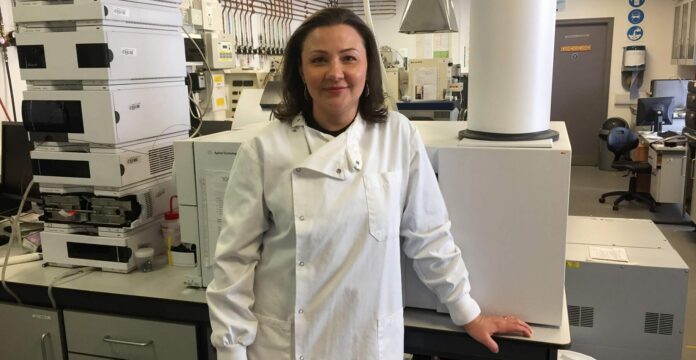DOCTOR Lena Madden woke up on Thursday morning to text messages offering condolences after the invasion of her home country by Russia.
An Ennis-based academic, Lena has lived in Ireland for 20 years and in the immediate aftermath of the Russian invasion of the Ukraine she is very concerned about the prospect of thousands of deaths.
“The thing that people don’t talk about is loss. The biggest thing is loss of human life. How many people will die? How many children will die? The soldiers are someone’s children too.”
Dr Madden’s father and step-mother were already here visiting when hostilities started, but her mother is living in the east of Ukraine.
“I’m from Donetsk, the place where the war is happening currently and where it started in 2014. I moved to Ireland in 2002, that’s 20 years ago. I didn’t live through the war, but my Mum says she has lived through war already. She’s got an approach that she lived through it already, she says don’t worry, it’s very quiet here, you know the way you would talk to your family, you don’t want to worry them.”
At the moment her mother is quite sick also, compounding Lena’s concerns.
While her mother is permitted to travel to other parts of the EU, she cannot come to Ireland. Several years ago she overstayed on a visa, at a time when she wasn’t able to leave because of bad health.
Now, she can travel to many other countries, but not to the one where she would have support.
“Ukraine has open borders with the rest of the EU, apart from Ireland would you believe? My Mum cannot come to Ireland. She was here nearly five years ago and she overstayed because she got sick, she’s an older person. Now they won’t give her a visa. If she took the train to Paris there would be no problem, there would be no visa, no requirements like that. And I am an Irish citizen who lives here and pays enough taxes to support a small family.”
The fact that Dr Madden is an Irish citizen – rather than a citizen of another EU country living here – is actually counting against her now.
“You know the crazy thing is if I was Polish or Spanish or a citizen of another European country my mum would be able to join me here and live with me, but because I’m an Irish citizen she can’t.”
“If I was a citizen of another EU country, the EU law would apply to me, but the Irish laws outweigh the EU laws in general. And I can provide for my mother, that wouldn’t be a problem, but she can’t come in. She stayed here for six to seven months when she was sick and couldn’t fly, but I didn’t take a penny from the Government.”
Even if they wanted to her father and stepmother couldn’t go back to the Ukraine now, with the airspace closed, but while they are out of harm’s way themselves, there is still huge distress about their loved ones.
“My step mum is crying this morning because my step sister is still in Ukraine, they’ve just finished building a house there. They have a good life there. Regardless of what Russia says, Ukraine is developing, it’s turning more European, it has started to prosper and that doesn’t suit someone.”
“Please help us.”
In a protest outside the Dáil,
Olena Redrugina, a Ukrainian living in Dublin, calls for “the biggest sanctions imaginable” on Russia, in the wake of the invasion of #Ukraine. pic.twitter.com/kWKclapoRZ— Philip Bromwell (@philipbromwell) February 24, 2022
Like Irish people consume UK television shows, people in the Ukraine watch programmes from Russia, which Lena says helped to promote pro-Russian sentiment and propaganda, particularly in the east of the country.
“The USSR would have had these central television channels, they were of very good quality, lots of money poured in, interesting programmes and people liked them. By inertia people in the Ukraine kept watching them.
“Ukraine is a democracy, they don’t have the rules of China and Russia, which only gives you one source of information. Ukrainians get their information from everywhere, including Russia unfortunately.
“So there are still people in Russia and Ukraine who believed in all that rubbish, and brainwashing. This is particularly in the east of Ukraine, close to the Russian border. Central Ukraine and the west of Ukraine, they are completely Europeanised. They are no different in their opinions and outlook on life than in the rest of Europe.”
Will the invasion change that thinking now in eastern Ukraine? “Oh yeah. There was a delusion previously with those who were listening to the television, but they’re opening their eyes now. Even in the east of the country it wasn’t like 90% of the population supported Russia, that was never the case. Now, when they are under attack, when Kharkiv is being bombed and people have to hide in the Metro, they’re opening their eyes.”
Many of those who will be involved in the invasion are just boys, she says, pawns being used by Putin.
“Every man in Russia has to go and serve in the army for two years at the age of 18. They’re boys, they’re young lads. Here, they might be called men on the radio but we all know that an 18-year-old is really a boy.”
She says the Ukrainian forces are experienced and will certainly be more determined, but they’ll be facing a better armed and resourced enemy.
“They don’t have the equipment Russia has, not to the same extent, but they have will and experience. It’s one thing to go and train in a field, but another thing to protect your country. They’re protecting their mothers, their wives, their children, it’ll be different to what Putin expects.”
The civilian population are also armed. “In the last two years the President signed a decree to allow carrying guns. People, regular people, were arming themselves, but they are calm. It’s kind of a fatalistic approach in some respects, but they are saying if anything is coming we will stand up.”
Given the depth of resistance and the size of the country, it would seem to be very difficult for Russia to continue to occupy it even if the invasion succeeds, but Lena says that isn’t Putin’s real goal.
“Of course not, it’s not possible. But the key here is punishment, it’s scaremongering, it’s destroying the economy of what he considers his land. I don’t think that man is right in the head. He considers Ukraine a part of his own nation, that it’s like a bold child that rebelled against its parents. That’s a crazy approach.”
She says that there is in fact a history of Ukrainian resistance that goes back hundreds of years.
Lena feels the UK is the European country most interested in supporting the Ukraine, but she feels relying on sanctions to deter Putin was never going to be effective.
“The bloody sanctions don’t matter. They can disconnect Russia from SWIFT, they can do what they want, those sanctions don’t matter.
“I’m not saying that Europe has to send troops but they have to send arms. They have to help Ukraine to protect itself. Sending of arms is vital for Ukraine currently.
“Sanctions won’t work. After 2014 he built a system of self sufficiency. Whatever you throw at Russia now, he’s just going to shrug it off. They’re prepared for it. Cancelling visas, imposing sanctions, even disconnecting them from SWIFT, it’s not going to do anything. The only way Europe can help Ukraine is financially and militarily to help Ukraine to protect itself.”
Owen Ryan has been a journalist with the Clare Champion since 2007, having previously worked with a number of other publications in Limerick, Cork and Galway. His first book will be published in December 2024.


